Daihatsu Kei Car
Smallest category of highway-legal Japanese cars

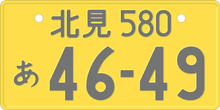
Private car kei license plate
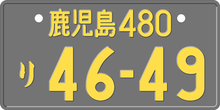
Commercial vehicle kei license plate
Kei car (or keijidōsha , kanji: 軽自動車 , "light automobile", pronounced [keːdʑidoːɕa]), known variously outside Japan as Japanese city car, ultramini, or Japanese microcar, is the Japanese vehicle category for the smallest highway-legal passenger cars. Similar Japanese categories exist for microvans, and kei trucks. These vehicles are most often the Japanese equivalent of the EU A-segment (city cars).
The kei-car category was created by the Japanese government in 1949, and the regulations have been revised several times since. These regulations specify a maximum vehicle size, engine capacity, and power output, so that owners may enjoy both tax and insurance benefits. In most rural areas they are also exempted from the requirement to certify that adequate parking is available for the vehicle.[1] [2] [3]
Kei cars have become very successful in Japan, consisting of over one-third of domestic new-car sales in fiscal 2016, despite dropping from a record 40% market share in 2013, after the government increased the kei-car tax by 50% in 2014.[4] [5] [6] In 2018, seven of the 10 top-selling models were kei cars, including the top four, all boxy passenger vans: Honda N-Box, Suzuki Spacia, Nissan Dayz, and Daihatsu Tanto.[7] Isuzu is the only manufacturer that has never offered a kei-sized vehicle for either private ownership or commercial trucks and microvans.
In export markets, though, the genre is generally too specialized and too small for most models to be profitable.[8] Notable exceptions exist, though, for instance the Suzuki Alto and Jimny models, which were exported consistently from around 1980. Kei cars are not only popular with the elderly, but they are also popular with youths because of their affordability.[9] [6]
Nearly all kei cars have been designed and manufactured in Japan, but a version of the French-made Smart was briefly imported and officially classified as a kei car, and since then, the British Caterham 7 160 has also received such classification.
Description [edit]
Kei cars feature yellow license plates, earning them the name "yellow-plate cars" (black numbers on yellow background for private use and yellow numbers on black background for commercial use) in English-speaking circles.[2] [3] Japanese government regulations limit the physical size, engine power, and engine displacement of kei cars. Keis have also been subject to other restrictions, such as lower speed limits, including a warning chime that goes off if being driven too fast.[10]
| Date | Max. length | Max. width | Max. height | Max. displacement | Max. power | |
|---|---|---|---|---|---|---|
| four-stroke | two-stroke | |||||
| July 1949 | 2.8 m (9.2 ft) | 1.0 m (3.3 ft) | 2.0 m (6.6 ft) | 150 cc | 100 cc | N/A |
| July 1950 | 3.0 m (9.8 ft) | 1.3 m (4.3 ft) | 300 cc | 200 cc | ||
| August 1951 | 360 cc | 240 cc | ||||
| 1 April 1955 | 360 cc | |||||
| 1 January 1976 | 3.2 m (10.5 ft) | 1.4 m (4.6 ft) | 550 cc | |||
| 1 January 1990 | 3.3 m (10.8 ft) | 660 cc | 47 kW (64 PS) | |||
| 1 October 1998 | 3.4 m (11.2 ft) | 1.48 m (4.9 ft) | ||||
Kei cars are often available with forced-induction engines, automatic and CV transmissions, front-wheel drive and all-wheel drive.[3]
History [edit]
360-cc era (1949–1975) [edit]
The kei-car legal class originated in the era following the end of World War Two, when most Japanese could not afford a full-sized car, but many had enough money to buy a motorcycle. To promote the growth of the car industry, as well as to offer an alternative delivery method to small business and shop owners, the kei- car category and standards were created.[1] Originally limited to a displacement of only 150 cc (9 cu in; 150 cm3) (or just 100 cc for two-stroke engines) in 1949, dimensions and engine size limitations were gradually expanded (in 1950, 1951, and 1955) to tempt more manufacturers to produce kei cars.
In 1955, the displacement limit increased to 360 cc (22 cu in) for both two-stroke and four-stroke engines, resulting in several new kei-car models beginning production in the following years. These included the 1955 Suzuki Suzulight[13] and the 1958 Subaru 360, the first mass-produced kei car,[14] finally able to fill people's need for basic transportation without being too severely compromised. In 1955, the Japanese Ministry of International Trade and Industry also set forth goals to develop a "national car" that was larger than kei cars produced at the time. This goal influenced Japanese automobile manufacturers to determine how best to focus their product development efforts for the smaller cars, or the larger "national car". The small exterior dimensions and engine displacement reflected the driving environment in Japan, with speed limits in Japan realistically not exceeding 40 km/h (24.9 mph) in urban areas. Keis were not allowed to be driven any faster than 40 km/h until the mid-1960s, when the kei speed limit was increased to 60 km/h (37.3 mph).
The class then went through a period of ever increasing sophistication,[15] with an automatic transmission appearing in the Honda N360 in August 1968, with front disc brakes becoming available on a number of sporting kei cars, beginning with the Honda Z GS of January 1970.[16] Power outputs also kept climbing, reaching a peak in the 40 PS (29 kW; 39 hp) Daihatsu Fellow Max SS of July 1970.[17] Sales increased steadily, reaching a peak of 750,000 in 1970. Throughout the 1970s, the government kept whittling away at the benefits offered to kei vehicles, which combined with ever stricter emissions standards to lower sales drastically through the first half of the decade.[15] Honda and Mazda withdrew from the contracting passenger kei-car market, in 1974 and 1976, respectively, although they both maintained a limited offering of commercial vehicles.
Until 31 December 1974, kei cars used smaller license plates than regular cars 230 mm × 125 mm (9.1 in × 4.9 in). As of 1975, they received the medium-sized standard plates, which are 330 mm × 165 mm (13.0 in × 6.5 in). To set them apart from regular passenger cars, the plates were now yellow and black rather than white and green.
550-cc era (1976–1990) [edit]

Sales had been steadily declining, reaching a low-water mark of 150,000 passenger cars in 1975, 80% less than 1970 sales. Many were beginning to doubt the continued existence of the kei car, with both Honda and Mazda withdrawing in the middle of the 1970s.[18]
Emissions laws were another problem for the kei-car industry in the mid-1970s. From 1973 to 1978, emissions standards were to be tightened in four steps.[19] Meeting the stricter standards, which were to be introduced in 1975, would be problematic for manufacturers of kei cars. This was particularly hard for Daihatsu and Suzuki, which focused on two-stroke engines, especially Suzuki, a relatively small company whose entire production consisted of two-stroke kei cars.[20] Daihatsu, though, had both the engineering backing and powerful connections of their large owner, Toyota, to aid them in meeting the new requirements. All manufacturers of kei cars were clamoring for increased engine displacement and vehicle size limits, claiming that the emissions standards could not be met with a functional 360-cc engine. In the end, the Japanese legislature relented, increasing the overall length and width restrictions by 200 mm (7.9 in) and 100 mm (3.9 in), respectively. Engine size was increased to 550 cc (33.6 cu in), taking effect from 1 January 1976.[20] The new standards were announced on 26 August 1975, leaving very little time for manufacturers to revise their designs to take advantage of the new limits.[21]
Most manufacturers were somewhat surprised by the decision; having expected a 500 cc (30.5 cu in) limit, they had already developed new engines to fit such restrictions. These new engines were quickly introduced, usually mounted within widened bodies of existing models.[18] These interim versions (with displacements ranging between 443 and 490 cc) were "feelers", developed to see if indeed a continued market existed for the kei car.[18] As sales improved, they only lasted for a model year or so until manufacturers had the time to develop "full-sized" engines. Only Daihatsu managed to avoid developing transitional engine versions that did not take full advantage of the new regulations. Kei-car sales remained stagnant, however, while combined passenger and commercial kei car sales reached 700,000 for the first time since 1974,[19] the small cars still lost market share in a quickly growing market.
As the kei cars became larger and more powerful, another benefit appeared, as exports increased considerably. In particular, export sales of trucks increased, while kei passenger car exports increased at a lower rate. In 1976, combined exports of kei cars and trucks were 74,633 (up 171% year-on-year), despite exports of passenger kei cars decreasing.[22] In 1980, another record year occurred as exports climbed 80.3% (to 94,301 units), of which 77.6% were microtrucks.[23] Nearly 17% of exports went to Europe, dwarfed by Chile, which took nearly a quarter of the exported keis.[23] Due to the difficult economic environment, low-priced cars sold well and 1981 marked another successful year as Japanese midget car sales reached their highest since the 1970 record (at 1,229,809 units for cars and commercials).[24]
As the 1980s progressed, kei cars became increasingly refined, losing their utilitarian origins, as Japanese customers became ever better off. Features such as four-wheel drive, turbochargers, and air conditioning began to become available on kei-car models. Conversely, van versions of the small hatchbacks were now marketed to nonbusiness users, to take advantage of even lower taxation and laxer emissions rules; this move in the market was spearheaded by Suzuki with their 1979 Alto, and competitors soon followed suit, with the Subaru Family Rex and the Daihatsu Mira appearing within a year's time.[25]
In the 1980s, the speed limit for kei cars was 80 km/h (50 mph). Government rules also mandated a warning chime to alert the driver if this speed were exceeded.[10]
660-cc era (1990–2014) [edit]

The kei car regulations were revised in March 1990, allowing engines an increase of 110 cc (6.7 cu in) in displacement, and the overall car length to be increased by 100 mm (3.9 in). These changes occurred during the 1990s Japanese economic bubble, and all manufacturers quickly developed new models to suit. Within five months, all the major models of kei cars had switched from 550- to 660-cc engines.[26] For the first time, a power limit was also applied, in addition to the limit on engine size. This power limit of 64 PS (47 kW; 63 hp) matched the highest output reached by any kei manufacturer at the time and was a gentlemen's agreement amongst the manufacturers in an effort to avoid a kei-class horsepower war.[27] The only kei-engined car to have exceeded this limit was the Caterham 7 160, a lightweight British sports car that was not expected to qualify as a kei, though it is small enough (in dimensions and displacement) to fit the regulations. Its engine is rated at 80 hp (60 kW; 81 PS), and since that is how the car is homologated in the United Kingdom, the Japanese authorities told the importer that its power should remain unchanged.[27]
The addition of a power limit was a response to the ever-increasing power outputs available with turbocharging and multivalve technologies popularized in the late '80s. Engine technology was also shared with sport bikes, which are designed for rider enjoyment, and less so for fuel economy - going against the idea of small, people's cars and putting the kei cars' tax and structural advantages at risk of a governmental backlash. The Japan Automobile Manufacturers Association also self-imposes a speed limit for kei cars of 140 km/h (87 mph).[28]
In a rare example of an overseas mass-produced model being sold as a kei car in Japan, a kei version of the Smart Fortwo (called the Smart K) was sold at the Yanase dealerships in Japan from 2001 to 2004. The Smart K used revised rear fenders and reduced tire dimensions and track width to conform to kei-car regulations.[29] The model was not a success, and it sold the fewest examples of a kei car when it was marketed.[3]
The Suzuki Wagon R was the best-selling kei car in Japan from 2003 to 2008.[30]
Starting in 2011, Toyota entered the kei-car market for the first time. The resulting Toyota Pixis Space, a rebadged Daihatsu Move Conte, was expected to increase competition in that market.[31] Currently, Nissan and Mitsubishi jointly produce the Mitsubishi eK (also sold as the Nissan Dayz or Nissan Otti). Honda's kei-car line-up, the N-one, N-Box, and N-WGN, accounts for around a quarter of its overall sales.[31]
Reduced incentives (2014–present) [edit]
In April 2014, the Japanese government significantly reduced advantages for kei-car owners, imposing higher sales tax, higher gasoline tax and higher kei-car tax – the last of which was raised by 50% – greatly reducing their tax benefits, compared to regular-sized cars.[5]
Daihatsu, Honda, Mitsubishi (through NMKV joint venture), and Suzuki are currently the only mass-production manufacturers of kei cars. Nissan sells rebadged Mitsubishi and Suzuki models,[32] Mazda sells rebadged Suzuki models, and Toyota and Subaru sell badge-engineered Daihatsu models.
Electric kei cars [edit]
The 2009 Japanese domestic market Mitsubishi i-MiEV was the first electric kei car, and the world's first mass-produced electric car.[33] [34] [6] Sales began in 2009 to fleet purchasers and in 2010 to the general public. In Japan, the car is called the i-MiEV, an acronym for Mitsubishi innovative Electric Vehicle. The i-MiEV uses a 47 kW (63 hp) permanent-magnet motor. Current models charge overnight in 14 hours from home 110-volt mains, or in 30 minutes from quick-charging stations installed at fleet locations. The range is 100 km (62 mi) using the U.S. EPA testing routine and 160 km (99 mi) using the Japanese Transport Ministry's testing routine.
Current taxation and insurance [edit]
The vehicle excise tax levy is 2% of the purchase price, compared to 3% for a regular car.[35]
An automobile weight tax also is levied: The amount is ¥13,200 and ¥8,800 for a three- and two-year period, respectively, as compared to the ¥18,900 and ¥12,600 charged for larger-sized passenger cars. The savings are thus more than 30% in both cases. This weight tax is paid after the vehicle has passed its safety inspection.
The required road tax is based on the engine's displacement.
A 24-month insurance contract typically costs ¥18,980 at the time of registration, versus ¥22,470 for a larger car.
Best-selling models [edit]
Gallery [edit]
360-cc era [edit]
550-cc era [edit]
Sport [edit]
Present [edit]
See also [edit]
- Kei truck
References [edit]
- ^ a b Nunn, Peter (January–February 2005). "Minicars: Cheap and Cheerful". JAMA. Retrieved 10 May 2012.
- ^ a b "Owning a Car in Japan", ALTs in Sendai (via Internet Archive)
- ^ a b c d "Small Things in Good Packages", Jerry Garrett, New York Times, 25 November 2007
- ^ Auto sales in Japan rebound to 5m units, led by Toyota – Nikkei Asian Review
- ^ a b Japan Seeks to Squelch Its Tiny Cars – The New York Times
- ^ a b c Posky, Matt (5 September 2017). "Government Intervention is Intentionally Killing the Japanese Kei Car". The Truth About Cars . Retrieved 19 August 2019.
- ^ Schreffler, Roger (5 February 2019). "Mini-Car Sales Up in Japan in 2018, Bigger Vehicles Down". WardsAuto . Retrieved 20 August 2019.
- ^ Rees, p. 79
- ^ Tajitsu, Naomi (10 October 2018). "Aging Japan: Built for young families, minicars attract a huge..." Reuters . Retrieved 20 August 2019.
- ^ a b Csere, Csaba (November 1986). "Honda Today: Space efficiency doesn't have to be ugly". Car and Driver. Vol. 32 no. 5. CBS Magazines. p. 110.
- ^ "軽自動車とは" (in Japanese). Kei car Inspection Organization. 16 December 2014. Retrieved 21 September 2020.
- ^ "道路運送車両法". 一般財団法人 自動車検査登録情報協会 (Automobile Inspection & Registration Information Association) (in Japanese). 一般財団法人 自動車検査登録情報協会. Retrieved 29 November 2016.
- ^ "Suzuki Fronte, Suzuki Alto, Suzuki Cervo, Suzuki Kei". www.xs4all.nl . Retrieved 1 January 2019.
- ^ http://blog.autorec.co.jp/2015/10/kei-jidosha.html
- ^ a b Rees, p. 78
- ^ Nippon Kei Car Memorial, p. 79
- ^ Nippon Kei Car Memorial, p. 75
- ^ a b c Yamaguchi, Jack K. (1977), "The Year of the Third Power", World Cars 1977, Pelham, NY: The Automobile Club of Italy/Herald Books: 56, ISBN0-910714-09-6
- ^ a b Yamaguchi, Jack K. (1979). Lösch, Annamaria (ed.). "The Year of Uncertainty?". World Cars 1979. Pelham, NY: The Automobile Club of Italy/Herald Books: 61. ISBN0-910714-11-8.
- ^ a b Yamaguchi, Jack K. (1976), "Japan: Reluctant Number One", World Cars 1976, Bronxville, NY: L'Editrice dell'Automobile LEA/Herald Books: 56, ISBN0-910714-08-8
- ^ Nippon Kei Car Memorial, p. 91
- ^ "Japanese Motor Vehicles Guide Book, Volume 25". 自動車ガイドブック [Japanese Motor Vehicles Guide Book] (in Japanese). Japan: Japan Automobile Manufacturers Association. 25: 334. 10 October 1978. 0053-780025-3400.
- ^ a b "Midget car exports in 1980 hit record". Nihon Keizai Shimbun. Tokyo: 7. 24 February 1981.
- ^ "Midget car sales swell 21%". Nihon Keizai Shimbun. Tokyo: 7. 19 January 1982.
- ^ Yamaguchi, Jack K. (1980), Lösch, Annamaria (ed.), "Consummation of the Turbulent Decade", World Cars 1980, Pelham, New York: L'Editrice dell'Automobile LEA/Herald Books: 66–67, ISBN0-910714-12-6
- ^ "Goo-net カタログ: 三菱 ミニカ(MINICA)のグレード一覧: 1990年8月" [Goo-net Catalog: Mitsubishi Minica, 1990.08] (in Japanese). Goo-net. Archived from the original on 19 April 2020.
- ^ a b Schmitt, Bertel (17 January 2017). "Japan Hands British Caterham Unfair Advantage: 'Sorry, Suzuki, Daihatsu And Honda.'". Forbes. Archived from the original on 12 November 2020.
- ^ 藤田竜太 (Ryuta Fujita] (25 September 2017). "法的な義務はなし! 軽140km/h・普通車は180km/hのリミッター速度はどう決められたのか" [No legal obligations! How were the speed limiters of 140km/h for kei cars and 180km/h for ordinary cars selected?]. Web Cartop (in Japanese). Kotsu Times Sha Co., Ltd. Archived from the original on 9 November 2020.
- ^ "The 37th Tokyo Motor Show". Japan Automobile Manufactures Association. Retrieved 11 November 2011.
- ^ "Suzuki Wagon R 1st-Half Best-Selling Car for 5 Straight Years". Japan Corporate News Network KK. 6 October 2008. Archived from the original on 16 June 2010. Retrieved 14 December 2017.
- ^ a b "Toyota adds first minicar to Japan lineup". japantoday.com. 27 September 2011. Archived from the original on 20 September 2020.
- ^ "Nissan Adds Third Minicar to its Lineup in Japan". Edmunds.com. 10 June 2005. Archived from the original on 14 October 2007.
- ^ "Mitsubishi Firsts". www.evworld.com . Retrieved 1 January 2019.
- ^ "Mitsubishi Recalls 2009-2014 i-Miev Electric Cars for Faulty Brake Vacuum Pump". transportevolved.com . Retrieved 1 January 2019.
- ^ Consumption Tax Trends 2014 VAT/GST and excise rates, trends and policy issues: VAT/GST and excise rates, trends and policy issues. OECD. 2014. p. 153. ISBN9789264223943.
Further reading [edit]
| | Wikimedia Commons has media related to Kei cars. |
- 360cc: Nippon 軽自動車 Memorial 1950→1975 [Nippon Kei Car Memorial 1950–1975] (in Japanese). Tokyo: Yaesu Publishing. 2007. ISBN978-4-86144-083-0.
- Rees, Chris (1995). Microcar Mania. Minster Lovell & New Yatt, Oxfordshire, UK: Bookmarque Publishing. ISBN1-870519-18-3.
Source: https://en.wikipedia.org/wiki/Kei_car
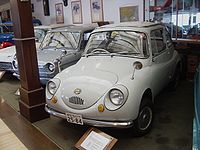
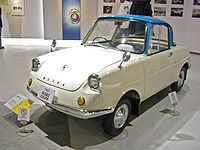
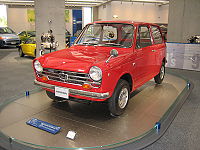
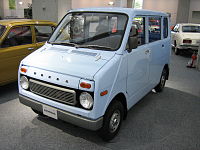





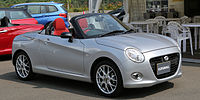


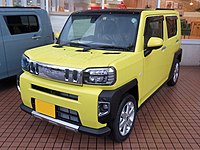

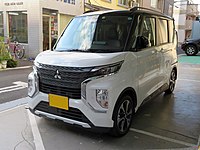












Tidak ada komentar:
Posting Komentar